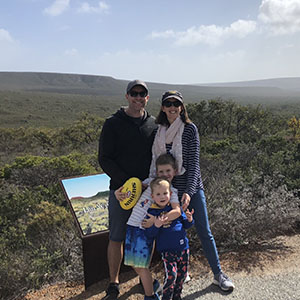 You’d never guess by Greg Prout’s modest demeanour that the Perth-based Principal is celebrating two big achievements this year: his 20th year with WA Insolvency Solutions (Jirsch Sutherland’s WA division) – and his registration as a Bankruptcy Trustee.
You’d never guess by Greg Prout’s modest demeanour that the Perth-based Principal is celebrating two big achievements this year: his 20th year with WA Insolvency Solutions (Jirsch Sutherland’s WA division) – and his registration as a Bankruptcy Trustee.
For someone who says he “didn’t even know what insolvency was” when he graduated from Murdoch University in 2002, Greg has come a long way in the industry. “I wanted to become an accountant. I had studied accounting in high school, and I just like numbers, I guess,” he says. “I’d graduated with a Bachelor of Commerce from Murdoch University and WAIS was offering an accounting role and I just wanted a full-time job. Back when I did my degree, it didn’t cover insolvency, so I didn’t know much about it. I got the job and got straight into it and enjoyed it – and still enjoy it now.”
Greg attributes his considered, logical approach to helping him in his role. “I’m generally a cool, calm, and collected person. I can stay calm and think through things logically and not get too flustered when an issue comes up,” he says. “This approach and explaining what can happen and what the consequences could be, really helps clients and potential clients understand insolvency. It’s also vital to treat everyone involved in an insolvency matter equally.”
It’s an approach that stands Greg in good stead when assisting directors who are considering going into external administration or individuals contemplating bankruptcy. “It’s a difficult decision for them, to take that next step. Sometimes our role involves some counselling, trying to help them and deal with their emotions as well. The Mental Health course all senior staff in the firm undertook definitely helped me. You have to be empathetic and understand it’s not easy for them – and the hardest part of the process is making ‘the call’ to put their company into administration or liquidation, especially if it’s a business that has been going for many years, it’s their livelihood and they potentially have to put off staff,” he explains.
“When you talk to them a few weeks after they have made the decision, they are relieved and often say a weight has been lifted from their shoulders and ponder why they didn’t do it a long time ago. Insolvency doesn’t mean ‘the end’, as there are many options to keep trading, restructure, avoid bankruptcy and move on. Our first line of thought is to attempt to restructure and move on, however, if we think it’s better to wind up, we will say that. And if people seek advice early there’s more options available to them.”
Dual registration

For Greg, it was a logical ‘next step’ to apply for his Bankruptcy Trustee registration and hold dual registrations (he was already a Registered Liquidator). “Because I’ve been working on both corporate and personal insolvencies, it made sense to get the registration and become the appointee on matters. Previously I could manage the files, but I couldn’t be the actual liquidator or trustee of a bankrupt estate. It goes hand in hand with having 20 years’ experience, as you can impart that knowledge to clients and referrers, and to colleagues coming through – train them up and give them all the knowledge that we can,” he says.
Based on the Bankruptcy Trustee registration application requisites, only senior-level practitioners with extensive experience and skills, and a superb track record are considered for Bankruptcy Trustee registration. And while Greg has all this and more, he found the process challenging.
“Even though I have the knowledge and experience, I needed to demonstrate this. In a two-hour interview with industry members, I had to answer about 30 questions, which means you really need to know your stuff, particularly on the Bankruptcy Act and legislation surrounding it. It was challenging but worth it at the end of the day,” he says.
Greg is already enjoying his expanded role. “I’ve been appointed to corporate insolvency matters since 2018 when I became a Registered Liquidator. Now my role is going to change from a bankruptcy point of view as I’ll now be the trustee on files as well,” he says. “I’m looking forward to offering clients and referrers further services. When I now meet with an accountant or adviser, it will be good to say I will be the trustee.”
Greg prefers to meet with clients and referrers in person, saying: “getting out there is the best way” – and he regularly travels to regional WA. “Since 2009, I’ve been travelling to Kalgoorlie every three months or so, and I visit Albany and Esperance a few times a year. We have an office in Kalgoorlie as it’s the busiest regional hub. I’ll fly in and out in a day to meet with a client or referrer. Sometimes I’m the only one not in high vis on a flight with FIFO workers!”
Currently, Greg is helping clients navigate the current economic challenges, including rising costs and labour shortages. “There are no backpackers or casual workers coming through. The pandemic made regional towns like Albany and Esperance busy, because people were travelling more within the state,” he adds.
Like many of his colleagues, Greg recharges on weekends by spending time with his family and watching sport. “My eldest son plays Auskick on weekends,” says Greg, who happily admits that while he enjoys his work, it’s his family that make him ‘tick’.
“Playing on teams you realise it’s all about teamwork, and that carries through to work. When you have bigger matters with lots of employees and creditors and emotions are running high, it’s the team effort that helps keep everything together and under control – everyone has their role within the team to make the team, as a whole, work,” he says.


